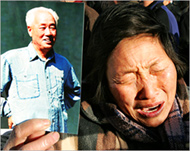Chinese diplomat defects in Sydney
A senior Chinese diplomat has said he is defecting to Australia because he can no longer support China’s repression of pro-democracy and religious groups.

Chen Yonglin, the 37-year-old consul for political affairs at China’s consulate in Sydney, appeared at a public rally on Saturday in the city to mark the anniversary of the Tiananmen Square massacre of pro-democracy activists in 1989 and said he had walked out of the mission four days ago.
“Because I had offered some help to some democracy activists and Falun Gong practitioners in some way,” the Chinese government considered him to be a threat, Chen said.
Falun Gong is an amalgam of religions, meditation and exercises that Beijing considers to be a cult.
Analysts said Chen’s defection could muddy Australia‘s ties with Beijing, its third largest trading partner with annual exchanges now worth $22.7 billion.
Chen said he was in hiding with his wife, Jin Ping, 38, and six-year-old daughter as he feared he would be kidnapped by Chinese agents.
The Weekend Australian newspaper reported Chen had applied for political asylum but officials had ruled this out and that Chinese consular security staff were searching for him.
Chinese embassy officials could not be reached for comment.
Fair hearing
A spokeswoman for Australia‘s Department of Foreign Affairs and Trade (DFAT) said the government knew of the matter but that it was a case for Australia‘s immigration department.
 |
|
The Tiananmen incident still |
“We are aware that an official from the Chinese consulate-general in Sydney has applied for a protection visa,” the spokeswoman said.
A protection visa would allow Chen, his wife and their daughter to remain in Australia permanently.
A spokeswoman for immigration officials said it was against policy to comment on individual cases for visas, but that if an application were filed, it would be given a fair hearing.
Chen’s bid to defect comes amid efforts by Australia to forge closer economic ties with China, which already spends billions of dollars annually on Australian iron ore, coal, wheat and other commodities.
Annual bilateral trade has quadrupled in the past decade, and the two countries are in early talks on a free trade agreement.
Major trading ally
“The problem for the government is that if this were back in the old Cold War days, and a person had fled from the communist embassy, we would have welcomed the person with open arms as we did with the Petrov scandal 40 years ago,” international affairs analyst Keith Suter told Sky News television.
|
“But now, of course, China is a major trading ally for Australia and we don’t want to do anything that’s going to be offending China in terms of its trade policies” |
“But now, of course, China is a major trading ally for Australia and we don’t want to do anything that’s going to be offending China in terms of its trade policies,” Suter said.
In 1954, a senior Soviet diplomat in Australia, Vladimir Mikhailovich Petrov, defected along with his wife, Evdokia.
The defections led to an extensive inquiry into Soviet espionage in Australia.
Moscow withdrew its embassy from Australia and expelled Australian diplomats.
Monitoring political dissidents
According to The Weekend Australian, DFAT told Chen his request for political asylum had been rejected but that he could apply for a protection visa.
The diplomat was quoted as saying that he had been monitoring political dissidents, including members of the Falun Gong religious sect, over the past four years, but had not reported on them in protest against Beijing‘s policies.